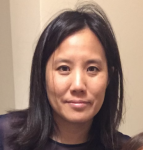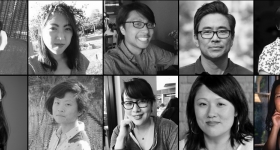This interview is PART II of a group conversation about Voices from the Railroad, a book about descendants of railroad workers who share personal stories and historical artifacts about their ancestors. The interview has been edited for length and clarity.
EC (Hyphen): What is a new frontier of research for you?
Andrea Yee: Aside from future projects to show how my great-grandfather’s life influenced each of his offspring, I am currently concentrating on locating the history of his first wife, a Native American woman, and their two biracial children. He was married in 1868 while building the railroad, and his family was taken from him in an 1875 Virginia City Chinatown fire. Anti-Chinese riots forced Lim and many others to flee. Ending up in San Francisco, at a decisive point in his life facing deportation, he decided the United States was his true home. He never left.
Russell Low: Ah Ying and Lai Wah had remarkable grandchildren, including my father Loren and his younger brother Stanley who fought in WWII. Stanley and his B-24 crew were lost on January 22, 1943, over New Guinea. Their plane was never found. Loren fought in the Pacific and was awarded a Silver Star on Saipan. The story of these two brothers in the Pacific in WWII is the subject of a book in progress. Their story really begins with Ah Ying and Lai Wah. And researching Stanley's crew of 10 men and how their story was silent for 80 years has been challenging and emotional. Contacting families of these men has uncovered forgotten letters and photographs that are bringing the men back to life. Telling their stories reminds all of us of the sacrifice so many made for our freedom.
Connie Young Yu: I’ve been involved in the archaeology of Chinese sites in Calif., such as Summit RR camp, and San Jose’s Chinatowns, Market St. and Heinlenville. Currently, the “frontier” is an ongoing archaeology project at Stanford University — the arboretum area where there were housing quarters for the many Chinese employed on “the Farm” (some former RR workers).
Vicki Tong Young: I am learning how to use internet resources such as ancestry.com, online genealogy classes offered by Chinese Family History Group of Southern California and the California Genealogical Society to add to the richness of my family's Chinese American journey. These groups help me network with other Asians who are hungry to learn about our shared past.
EC (Hyphen): How did your explorations into your ancestral history change your sense of self/identity/self-awareness when you learned about your family?
Andrea Yee: The drama of theater was my career background, but nothing compares to the drama experienced at the 150th Anniversary of the Transcontinental Railroad in Utah, May 10th, 2019. I sang for the first time the Star Spangled Banner with my heart overjoyed. At last, my feet are planted on this earth as an American and I somehow can see a far wider horizon!
Russell Low: I am a fourth-generation Chinese American who grew up American with very little awareness of Chinese culture or history. This continuing journey to discover my roots has helped me to appreciate more fully being Chinese and American. These immigrant stories, which we explore and celebrate, are part of what makes each of us American.
Connie Young Yu: In Voices, I tell of how my family’s history empowered me and gave me strength of identity. I always knew about my grandfather Young who had to carry around his Certificate of Residence required of all Chinese. And because of the Geary Act, I knew about the earthquake story of so many Chinese fleeing San Francisco and having to fight to return to Chinatown because the city wanted their land. Also, my maternal grandmother Lee was detained on Angel Island for 15 months. But no one but Chinese cared until the Civil Rights movement and the Third World Strike. Since then, I’ve lectured, written about them and been interviewed for documentaries, made some myself (Dr. Sun at Liberty’s Door and Digging to Chinatown), and most recently, I had the opportunity to tell my stories in the first episode of Asian Americans, the PBS series aired this past May 2020.
Vicki Tong Young: I was a history major at UCLA when the Asian American movement was just beginning in colleges in the United States, and I wrote my history thesis on the history of Los Angeles Chinatown. Now a retired teacher, I was fortunate to be videotaped and interviewed for the Stanford University/Chinese Historical Society of America Chinese Railroad Workers in North America Project, wrote a chapter in the book Voices from the Railroad and wrote a summary about my great-grandfather for a media display at the California State Railroad Museum. It has filled my heart with awe to discover the courage of our ancestors.
Paulette Liang: My mother had passed on many stories but corroborating the oral history and discovering unknown facts made me delve into the political and cultural environment my ancestors had to negotiate in order to survive. I want my grandchildren (the sixth generation) to know about the contributions of their ancestors.
Carolyn Kuhn: History of the wealthy is a tale more easily told than that of the people in need. Immigrants are an example of people who deserve to have their stories told. One cannot help but to feel motivated to learn more about the hardships of all immigrants after seeing the PBS special Asian Americans.
EC (Hyphen): What do you hope your audiences take away from the information you are providing?
Andrea Yee: My great-grandfather taught me that wisdom is hidden in human stories of the past. When we as a young nation cannot see or listen to their voices, the silence will condemn us to repeating past mistakes. Yet our young country has always given us the unique and treasured right and freedom to choose which path we wish to take. Let us move forward with hope and insight of the past for peace in a nation of all colors.
Russell Low: We all come from bold and courageous ancestors, and we are all in this together.
Connie Young Yu: That this is part of the American narrative, and they are part of it whether or not their grandfathers helped build the railroad. Our story of struggle against exclusion is the legacy of America’s immigration, to be grasped and embraced. I want the audience — particularly the younger generation — to be inspired and realize that history must be told by the people; oral history is the key; and they should go interview their grand folks themselves. Responsibilities? To challenge the U.S.’s institutionalized racism by speaking out, digging in hidden histories, making connections (i.e., between the Chinese Exclusion Law and today’s immigration exclusion and defending “Dreamers”).
Vicki Tong Young: My greatest hope is that my story will inspire others to discover their own family’s story, speak to the older relatives and preserve the story for the future generations. One thrill has been to discover three talented high school students from New Jersey. Sarah, Cameron and Victoria created a documentary called A Legacy Lost: The Mistreatment of the Chinese Through the Transcontinental Railroad, which won the National History Day competition for Asian American History in 2019. My oral interview was used as one of their primary source materials. The best reward is for us to remember and pass it on to the ones who follow!
Paulette Liang: I hope people will get a more nuanced understanding of the complexity of Chinese immigration and that there were many differences among the immigrant communities depending on which parts of China they originated from.
Carolyn Kuhn: The awkward struggles continue. I am a fourth-generation native of Denver, Colo., yet people are shocked that I can speak English. The truth is that I am illiterate in my native Cantonese language. Several years ago, our family visited a cousin in New York. The “New Chinatown” in New York was only a few blocks away from where we stayed. As my daughter and I walked to the delicatessens for breakfast, we heard many different Chinese dialects. I heard people speaking Mandarin, Taiwanese and in the Shanghainese language. Being barely able to understand what was being said, I felt like a stranger in a strange land. Still, I considered myself a “real” American whose roots came from the railroad builders.
EC (Hyphen): What kind of Asian American stories do you hope will be told in the future?
Russell Low: Honest stories of immigrant courage that unify us as a community and as a nation.
Connie Young Yu: More revelations about how our early ancestors survived, struggled and overcame inequities, from the Exclusion Law of 1882 to alien land laws, “the glass ceiling” and what they passed down to subsequent generations. Chinese Americans confronting xenophobia in the ’50s and now, the “other virus,” my maternal grandmother detained on Angel Island for 15 months because of racism. And how Asians have come together on issues of social justice and joined with Black Lives Matter and are becoming leaders in a movement to make America great (for the first time). At this time it is so important to highlight the crucial role of Asian Americans in building America, so thank you for contributing to the public archive with your insights and knowledge.
Vicki Tong Young: I hope the stories to be told in the future are each family’s stories. We do stand on the shoulders of giants, and it is worth the time and effort to listen and record them so they can be heard and remembered, especially at such a time as this!
Carolyn Kuhn: Thank goodness Chin Lin Sou was adventurous enough to sail to America. I feel quite grateful that I was born here. As I watch the people in Hong Kong struggle to maintain independence from China, I feel lucky to live in America. It is my hope that people who live in America will appreciate the pioneers who gave them the opportunity to live in freedom. New stories need to be told to reflect our changing times. If reporters such as Jeff Han are motivated to inquire about the Chinese laborers who helped to build America’s railroads, I hope that other historians will continue to ask more questions, perhaps imagining, “What would Chin Lin Sou say?”










Comments